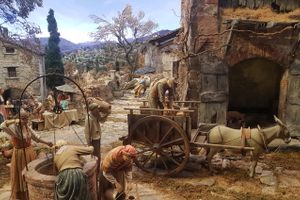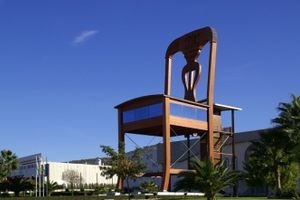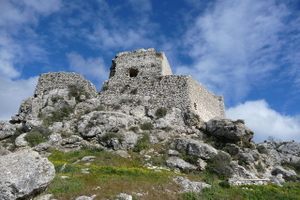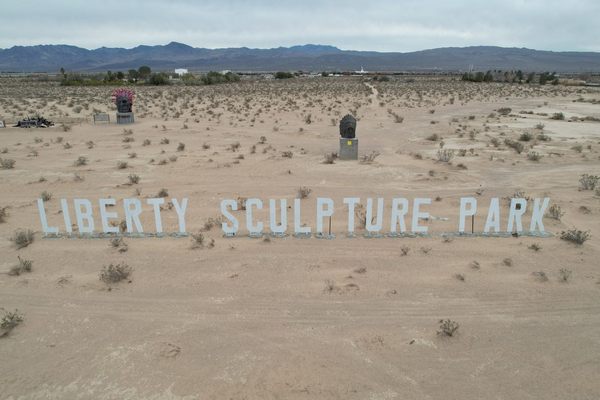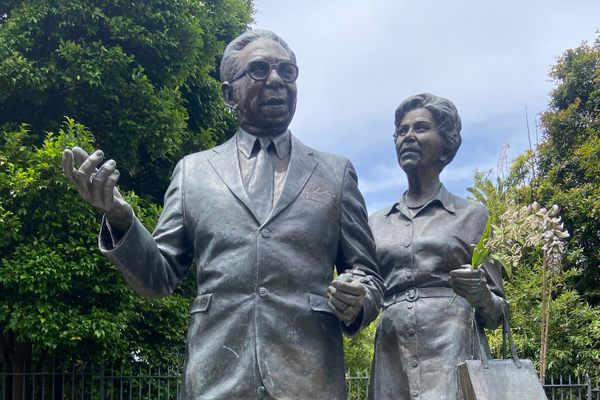About
Among the ancient olive groves deep in the "frying pan of Spain," where summer temperatures commonly reach above 113 degrees Fahrenheit (45 degrees Celsius), lies the small Andalusian village of Marinaleda, a self-styled micro-communist utopia.
At first glance, Marinaleda appears much like any other small agricultural town in the south of Spain. Orange trees line the streets of whitewashed houses; shuttered windows provide shade from the fierce summer sun; sundried old ladies in black diligently sweep the dust away from their doors; cockerels crow and dogs bark day and night; domino players shout and laugh outside the numerous café bars and social clubs. All seems quite typical of a Pueblo in the Province of Seville.
However, walk around the village, and you start to notice the unusual. The streets and squares have been renamed after heroes of the Spanish and Latin American socialist causes, like Allende and Lorca, or given names like Calle Solidaridad, (Solidarity Street) and Calle Fraternidad (Brotherhood Street).
The community sports and leisure centre, disproportionate in size relative to the rest of the village, bears an enormous likeness of "Che" Guevara, watching guardian-like over the happenings in the streets below. And hundreds of painted murals with socialist themes by graffiti artists, both local and international, are tolerated in the otherwise idyllic Andalusian streets.
Above the disproportionately large Ayuntamiento, or town hall, the unique flag of the village flies high, bearing a roundel showing a typical Andalusian village scene with a rainbow and dove of peace overhead, superimposed on the traditional tricolour of Andalusia. It bears the motto "Marinaleda: Una Utopia Hacia la Paz’": A Utopia for Peace.
How this small rural village in a Western European democracy has transformed itself into a self-contained self-styled micro-communist utopia since 1980 is largely due to the life work and political ideology of one man, former mayor Juan Manuel Sanchez-Gordillo.
Five years after the death of Spain’s military dictator, General Franco, the villagers of Marinaleda were suffering high unemployment and poverty while nearby, potentially productive agricultural land belonging to wealthy absentee landlords was left wild and uncultivated. Under the leadership of Sanchez-Gordillo, the unemployed villagers occupied and farmed the idle land illegally.
After numerous arrests and evictions over the following years failed to dissuade the villagers from their repeated occupation, the absent landowner relented and gifted part of his unused lands to the village. Ever since, it has been managed by the Ayuntamiento as part of a communal workers cooperative, which now also includes a publicly owned food processing plant on the main street.
Although random police checks on those entering and leaving the village are not uncommon, there are no police permitted inside Marinaleda; the Ayuntamiento refuses to pay for a police force on ideological grounds. Despite this, the village enjoys comparatively low crime rates. Savings on law enforcement have, in part, helped to fund the enviable local sports and recreational facilities. Since 1990, low-cost, self-built housing projects have been overseen by the Ayuntamiento, with plots offered mortgage-free, on the condition that they are not later sold on by the owner-occupier.
Unemployment in Marninaleda has been almost eradicated, and although many villagers have alternative employment, all are permitted work in the cooperatively run farming and food processing operations should they wish, or need to.
Life has not been entirely utopian for the villagers however. As the 2008 financial crisis developed, Sanchez-Gordillo lead his Pueblo on several raids of national supermarket chains in neighbouring towns. As a result of these raids, several Marinaledans were arrested for stealing foodstuffs to distribute amongst the village poor. This gained Marinaleda national and international notoriety, and earned the former mayor the nickname of the "Spanish Robin Hood."
Related Tags
Know Before You Go
About an hours drive from Malaga Airport or Seville Airport, there are currently no bus or train services to Marinaleda, so a hire car is probably the easiest way to reach the village. A taxi from nearby towns wth better transport links like Osuna and Estepa would be a cheaper option. If you decide to walk, as always in this part of the world, a hat, sunglasses and plenty of water is a must between May and October. The published coordinates are for the Avenida Libertad in the centre of the Pueblo.
Published
May 30, 2017




































